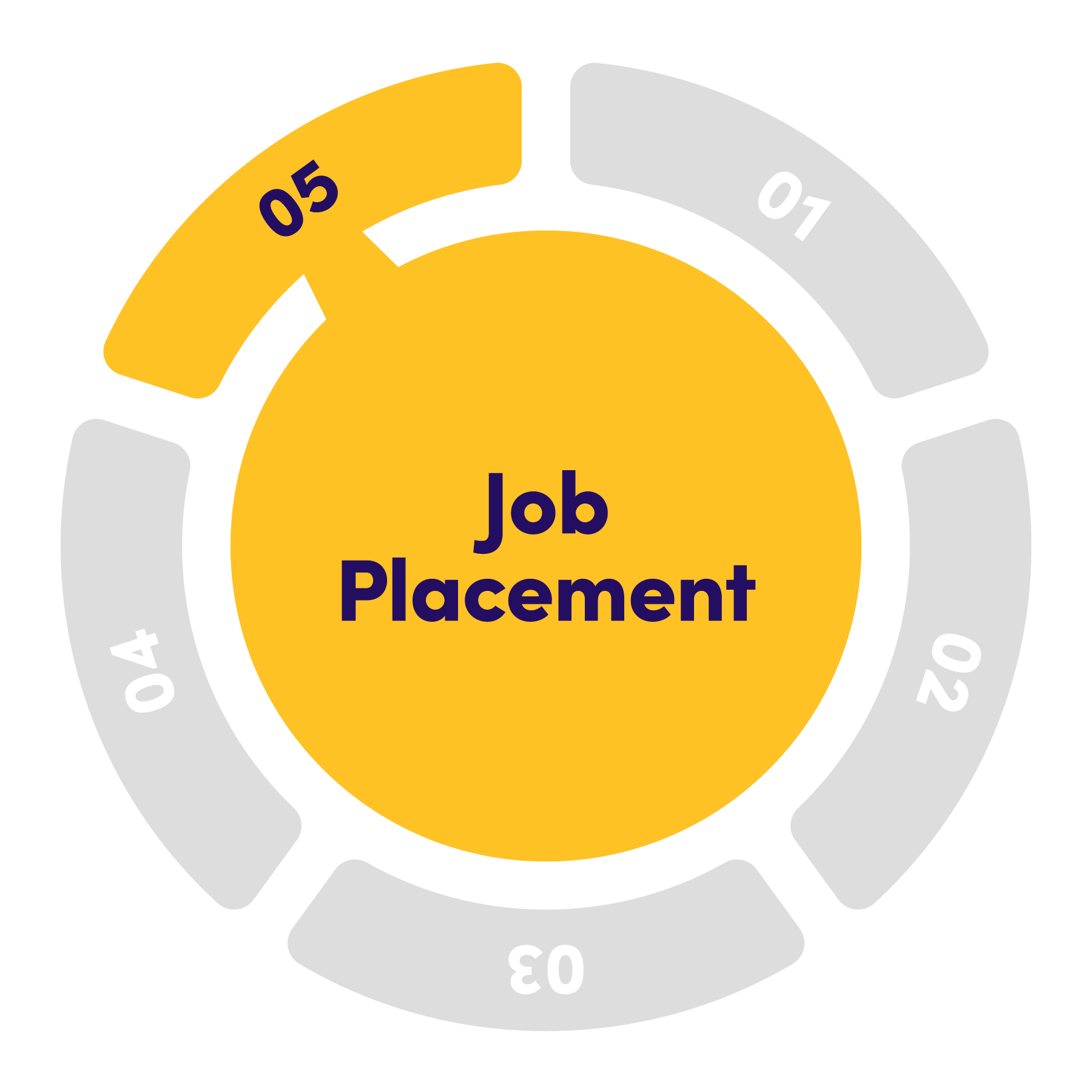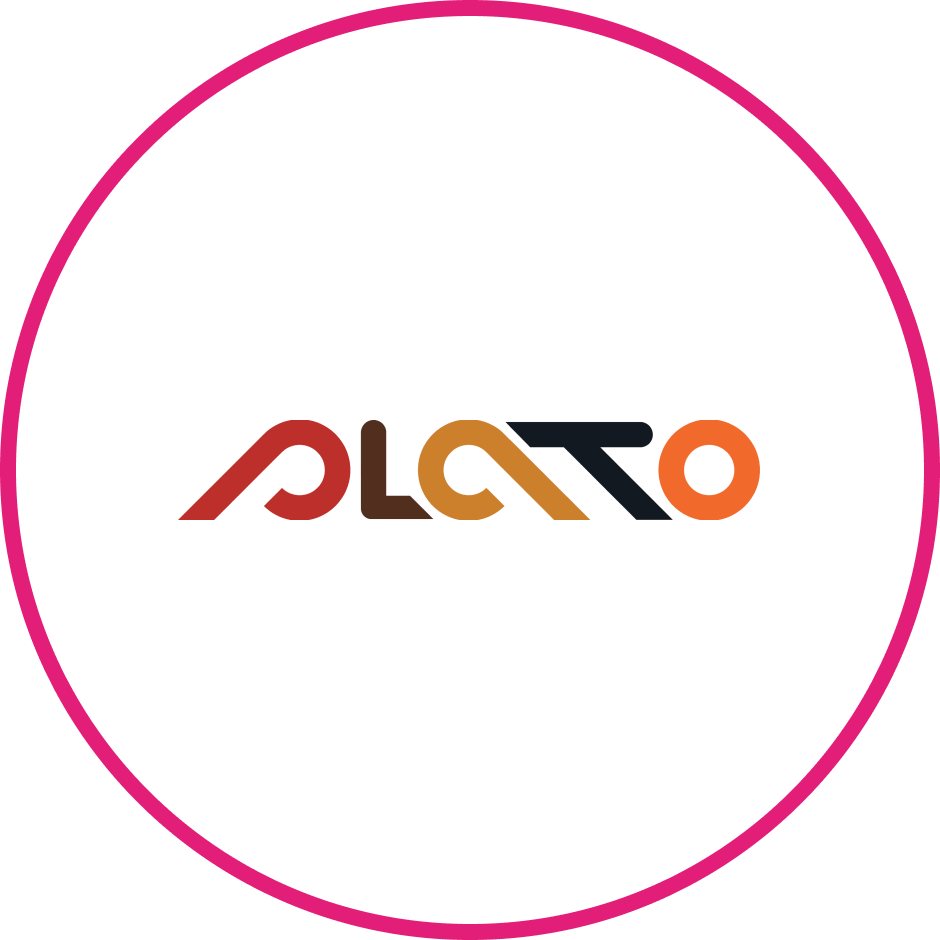
Job Placement
Follow Sarah’s reskilling journey and discover the practical benefits of Job Placement for all players in the Rapid Skilling System. Then explore real-world examples and best practices around Job Placement.

Step 5 of Sarah’s Journey
Finding an internship
“Where do I get real-world experience so I can get a job?”
As Sarah nears the end of her training program, she worries about how she will find her first job after graduation. Thankfully, her program includes a short-term paid internship at a local tech firm where she can hone her professional skills.
Sarah is pleased to hear that their workplace offers accommodations for single parents. On her first day, she is nervous, but her confidence builds when she realizes how well her training has prepared her to perform her duties.
At the end of her work placement, Sarah has not only sharpened her skillset further, but she has some real life experience in a tech workplace. Her work placement has also given her access to a wider network that will help her find her next job.

What is Job Placement?
Job placement is a service offered by educational institutions, employment agencies and recruiters to help individuals find work. Types of job placement include: internships (paid or unpaid), apprenticeships, real world projects and other work-intergrated learning (WIL) experiences.
The benefits of Job Placement:
For employers:
Access to new graduates and trained individuals allows for more strategic workforce planning, with employers able to anticipate and fill skills gaps more effectively.
For job seekers:
Job placement services often have exclusive access to jobs that are not advertised publicly, opening up a wider range of opportunities for job seekers.
For educators:
Strong industry partnerships can lead to funding opportunities for scholarships, new programs, and infrastructure improvements, benefiting an educational institution’s overall resources and capabilities.

Putting Job Placement in action
WHO: Educational Institutions and Training Providers.
ACTION: Find industry partners and funding to make internships, apprenticeships, and other work-intergrated learning (WIL) experiences an integral part of the learning process to help graduates have a seamless transition into their new careers.
Other considerations
Providing work opportunities for graduates
Most educational institutions and training programs would like to have a job placement component for their graduates, but it’s difficult and expensive to do so. It requires connections with the industry and often external funding sources. However, innovative Work-Integrated Learning (WIL) initiatives have emerged to address this challenge. These programs embed learners within real-world work environments, providing hands-on experience and networking opportunities. Here are some examples of innovative WIL programs:
Project-based learning with industry partners:
Riipen: Riipen is a work-based learning platform that facilitates collaboration between educators, organizations, and learners on real industry projects. Learners benefit from Riipen by gaining hands-on experience, building relevant skills, and expanding their professional networks through industry projects.
Hackathons
AfriHacks: AfriHacks is a pioneering hackathon by World Innovation League (WIL), led by
CEO Uchi Uchibeke. It embraces participants from diverse backgrounds and skill levels, providing a platform for collaborative creation and skill enhancement. Through its virtual format, AfriHacks ensures accessibility to participants worldwide, breaking geographical barriers and facilitating workshops, mentorship sessions, and the highly anticipated Demo Day online.
Entrepreneurship and innovation hubs:
Toronto Metropolitan University’s Zone Learning Program: TMU’s Zone Learning program fosters entrepreneurship and innovation by providing students with access to specialized incubators and entrepreneurship hubs. These hubs offer resources, mentorship, and networking opportunities to support students in launching their own startups or social ventures.
Industry-academia collaborative research:
Mitacs Accelerate Program: Mitacs facilitates industry-academia collaborative research projects that address industry challenges and drive innovation. Through internships and fellowships, graduate students and postdoctoral researchers work with industry partners on research projects, bridging the gap between academia and industry.

Innovation in Action
The PLATO Software Tester Training program
PLATO is an Indigenous-led and staffed IT services and training firm that is using an innovative train-and-employ apprenticeship model to create careers in technology for First Nations, Inuit, and Métis people from coast to coast to coast.
What they’re doing
PLATO invites individuals to apply who have First Nation, Inuit, or Métis heritage who have an interest in a career in Information Technology, a desire to learn and a High School diploma, GED 12, or equivalent experience. The program consists of 5 months of in-class training and a 4 month paid internship. Successful graduates are offered a full-time apprentice position with full benefits and paid vacation. Upon completion, they join the team at PLATO as junior software testers.
The Train-and-Employ Model
PLATO’s unique model supports learners at every stage, even guaranteeing its graduates full-time, well-paying jobs as software testers once they complete their internship.

Expansion into cloud computing
PLATO is offering another opportunity geared at helping unemployed and underemployed Indigenous individuals develop skills for cloud careers by partnering with BMO Financial Group to offer the Amazon Web Services (AWS) re/Start program.
Students take a 12-week classroom-based cloud computing training course, which is followed by an internship with BMO to help prepare them for potential entry-level jobs. The program also provides learners with resume and interview coaching to help them get ready for employer meetings and interviews.
Impressive results
A pioneer of innovative Indigenous tech apprenticeships, PLATO is a shining example of the power of integrating job placement into the training process. To date, PLATO employs 50+ full-time Indigenous software testers and has:
- trained 300+ Indigenous software testers, many of whom still work for the company today in and around their home communities
- built a network of 1,000+ Indigenous software testers across the country
- opened offices on or near Indigenous communities across Canada

Congratulations!
Your journey with Sarah through the Rapid Skilling System Playbook is complete. We hope you use what you’ve learned here and apply these best practices to help create a culture of continuous improvement. For more tips and inspiration, visit our Digital Insights Blog: